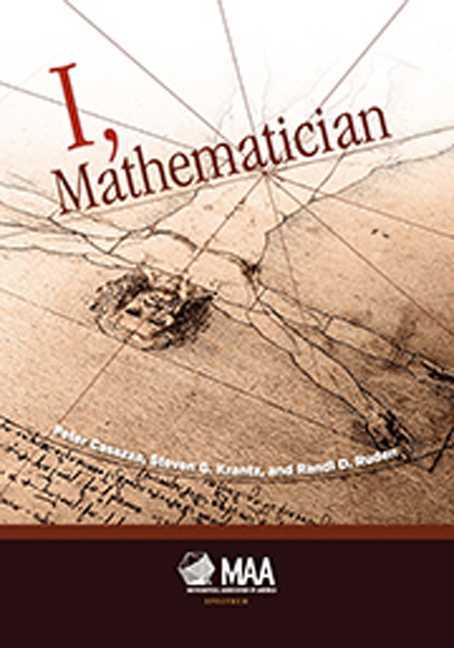Book contents
- Frontmatter
- Contents
- Preface
- Part 1 Who Are Mathematicians?
- Part II On Becoming a Mathematician
- Foreword to On Becoming a Mathematician
- 11 Mathematics and Teaching
- 12 Who We Are and How We Got That Way?
- 13 Social Class and Mathematical Values in the USA
- 14 The Badly Taught High School Calculus Lesson and the Mathematical Journey It Led Me To
- 15 The Psychology of Being a Mathematician
- 16 Dynamics of Mathematical Groups
- 17 Mathematics, Art, Civilization
- 18 Questions about Mathematics
- 19 A Woman Mathematician's Journey
- Part III Why I Became a Mathematician
11 - Mathematics and Teaching
from Part II - On Becoming a Mathematician
- Frontmatter
- Contents
- Preface
- Part 1 Who Are Mathematicians?
- Part II On Becoming a Mathematician
- Foreword to On Becoming a Mathematician
- 11 Mathematics and Teaching
- 12 Who We Are and How We Got That Way?
- 13 Social Class and Mathematical Values in the USA
- 14 The Badly Taught High School Calculus Lesson and the Mathematical Journey It Led Me To
- 15 The Psychology of Being a Mathematician
- 16 Dynamics of Mathematical Groups
- 17 Mathematics, Art, Civilization
- 18 Questions about Mathematics
- 19 A Woman Mathematician's Journey
- Part III Why I Became a Mathematician
Summary
Induction
I was not born to be a mathematician. Like many, I was drawn to mathematics by great teaching. Not that I was encouraged or mentored by supportive and caring teachers; such was not the case. It was instead that I had as teachers some remarkable mathematicianswhomade the highest expression of mathematical thinking visible, and available to be appreciated. This was like listening to fine music, with all of its beauty, charm, and sometimes magical surprise. Though not a musician, I felt that this practice of mathematical thinking was something I could pursue with great pleasure, and capably so even if not as a virtuoso. And I had the good fortune to be in a time and place where such pursuits were comfortably encouraged.
The watershed event for me was my freshman (honors) calculus course at Princeton. The course was directed by Emil Artin, with his graduate students John Tate and Serge Lang among its teaching assistants. It was essentially a Landau-style course in real analysis (i.e., one taught rigorously from first principles). Several notable mathematics research careers were launched by that course. Amid this cohort of brilliant students, I hardly entertained ideas of an illustrious mathematical future, but I reveled in this ambience of beautiful thinking, and I could think of nothing more satisfying than to remain a part of that world. It was only some fifteen years later that I came to realize that this had not been a more or less standard freshman calculus course.
Certain mathematical dispositions that were sown in that course remain with me to this day, and influence both my research and my teaching. First is the paramount importance of proofs, as the defining source of mathematical truth. A theorem is a distilled product of a proof, but the proof is a mine from which much more may often be profitably extracted. Proof analysis may show that the argument in fact proves much more than the theorem statement captures. Certain hypotheses may have been not, or only weakly, used, and so a stronger conclusion might be drawn from the same argument. Two proofs may be observed to be structurally similar, and so the two theorems can be seen to be special cases of a more unifying claim. The most agreeable proofs explain, rather than just establish, truth. And the logical narrative clearly distinguishes the illuminating turn from technical routine.
- Type
- Chapter
- Information
- I, Mathematician , pp. 129 - 139Publisher: Mathematical Association of AmericaPrint publication year: 2015
- 1
- Cited by



